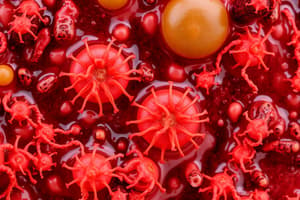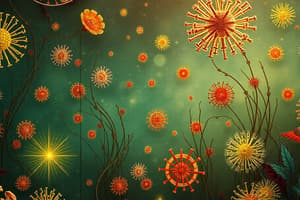Podcast
Questions and Answers
What is the study of pathogens, diagnostics, and disease prevention called?
What is the study of pathogens, diagnostics, and disease prevention called?
Medical Microbiology
What is the role of microorganisms in ecosystems, biogeochemical cycles, and pollution remediation called?
What is the role of microorganisms in ecosystems, biogeochemical cycles, and pollution remediation called?
Environmental Microbiology
What is the study of microorganisms in fermentation, enzyme production, and pharmaceuticals called?
What is the study of microorganisms in fermentation, enzyme production, and pharmaceuticals called?
Industrial Microbiology
What is the branch of microbiology that focuses on enhancing crop productivity through nitrogen fixation and pest control called?
What is the branch of microbiology that focuses on enhancing crop productivity through nitrogen fixation and pest control called?
What branch of microbiology deals with understanding food spoilage and developing preservation methods?
What branch of microbiology deals with understanding food spoilage and developing preservation methods?
Prokaryotes are organisms lacking a nucleus with cell walls containing peptidoglycan
Prokaryotes are organisms lacking a nucleus with cell walls containing peptidoglycan
What is the name for single-celled organisms lacking a nucleus, with cell walls containing peptidoglycan?
What is the name for single-celled organisms lacking a nucleus, with cell walls containing peptidoglycan?
What are prokaryotes that are distinct from bacteria, often found in extreme environments called?
What are prokaryotes that are distinct from bacteria, often found in extreme environments called?
Which of the following are examples of bacteria?
Which of the following are examples of bacteria?
Which of the following are examples of archaea?
Which of the following are examples of archaea?
Flashcards
Medical Microbiology
Medical Microbiology
The study of microorganisms and their role in disease, diagnosis, and prevention.
Environmental Microbiology
Environmental Microbiology
The study of microorganisms in natural environments, including their impact on biogeochemical cycles and pollution control.
Industrial Microbiology
Industrial Microbiology
Exploiting microorganisms for industrial processes like fermentation, enzyme production, and pharmaceutical manufacturing.
Agricultural Microbiology
Agricultural Microbiology
Signup and view all the flashcards
Food Microbiology
Food Microbiology
Signup and view all the flashcards
Bacteria
Bacteria
Signup and view all the flashcards
Archaea
Archaea
Signup and view all the flashcards
Classification of Microorganisms
Classification of Microorganisms
Signup and view all the flashcards
Nucleus
Nucleus
Signup and view all the flashcards
Peptidoglycan
Peptidoglycan
Signup and view all the flashcards
Heterotrophic
Heterotrophic
Signup and view all the flashcards
Photoautotrophic
Photoautotrophic
Signup and view all the flashcards
Chemoautotrophic
Chemoautotrophic
Signup and view all the flashcards
Domain
Domain
Signup and view all the flashcards
Kingdom
Kingdom
Signup and view all the flashcards
Phylum
Phylum
Signup and view all the flashcards
Class
Class
Signup and view all the flashcards
Order
Order
Signup and view all the flashcards
Family
Family
Signup and view all the flashcards
Genus
Genus
Signup and view all the flashcards
Study Notes
Scope of Microbiology
- Medical Microbiology: Studies pathogens, diagnostics, and disease prevention
- Environmental Microbiology: Role of microorganisms in ecosystems, biogeochemical cycles, and pollution remediation
- Industrial Microbiology: Applications in fermentation, enzyme production, and pharmaceuticals
- Agricultural Microbiology: Enhancing crop productivity via nitrogen fixation and pest control
- Food Microbiology: Focuses on understanding food spoilage and developing preservation methods
Classification of Microorganisms
- Prokaryotes:
- Bacteria: Single-celled organisms without a nucleus, cell walls containing peptidoglycan. Examples include Escherichia coli and Staphylococcus aureus.
- Archaea: Prokaryotes differing from bacteria, often found in extreme environments. Examples include Halobacterium and Thermoplasma.
Studying That Suits You
Use AI to generate personalized quizzes and flashcards to suit your learning preferences.




